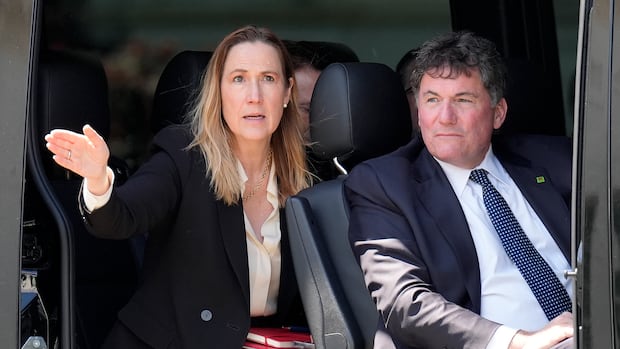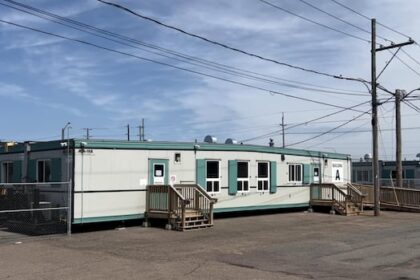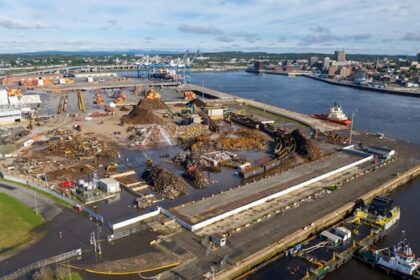PoliticsHigh-level trade talks between Canadian and U.S. officials are trudging on this week in Washington, D.C., where Canada is looking to strike deals on specific economic sectors currently bedeviling trade relations between the two countries. Industry minister says ‘it’s completely unacceptable’ Stellantis is moving Jeep production to U.SPeter Zimonjic · CBC News · Posted: Oct 14, 2025 2:48 PM EDT | Last Updated: October 15Canadian Ambassador to the United States Kirsten Hillman, left, and Intergovernmental Affairs Minister Dominic LeBlanc shown last week in Washington, D.C. LeBlanc and Hillman are back at it this week trying to land quick deals on aluminum, steel and energy. (The Canadian Press)High-level trade talks between Canadian and U.S. officials are trudging on this week in Washington, D.C., where Canada is looking to strike deals on specific economic sectors currently bedeviling trade relations between the two countries. Dominic LeBlanc, the minister of Canada-U.S. Trade, Privy Council Clerk Michael Sabia and other officials are specifically focused in the short term on securing deals for the steel, aluminum and energy sectors. “As Canada works towards an agreement with the United States, Minister LeBlanc is in Washington, D.C., this week for further engagements with senior U.S. officials,” Jean-Sebastien Comeau, LeBlanc’s spokesperson, told CBC News. At the end of Prime Minister Mark Carney’s visit to Washington last week, LeBlanc said the Canadian delegation’s meetings with U.S. officials resulted in “positive, substantive conversation on trade issues.”Those talks are continuing against a backdrop of increasing stress back home where some premiers and mayors are urging Carney to take a stronger stand against U.S. President Donald Trump. Leblanc said last week’s talks ended with Trump directing both U.S. Commerce Secretary Howard Lutnick and Trade Representative Jamieson Greer to continue talking to their Canadian counterparts about securing deals for the aluminum, steel and energy sectors. “We talked about ways to quickly arrive at a deal that will bring, we hope, better circumstance to both countries in these sectors of significant importance,” LeBlanc said. If deals can be struck “quickly,” LeBlanc said, the conversation between the two countries could move on to making “progress on other sectors as well.”Effects of trade war weigh heavilyIn order to force automakers to relocate to the U.S., Trump imposed 25 per cent tariffs on cars and light duty trucks, excluding the value of the vehicle made from U.S. parts. Stellantis announced this week that it will invest $13 billion US over the next four years to expand its manufacturing capacity, creating more than 5,000 jobs in Illinois, Ohio, Michigan and Indiana.The company, formerly known as Chrysler, says the Jeep Compass, previously slated to be made at the Brampton Assembly Plant, will move to the Belvidere Assembly Plant in Illinois, although the company says it still has plans for the Brampton facility. The move has irked both the federal and Ontario governments who in 2023 struck a deal with Stellantis-LG Energy Solutions to provide performance incentives worth up to $15 billion for batteries that Stellantis produces and sells.As a part of the deal Stellantis was required to “uphold its existing commitments in Canada and Ontario, including a production mandate at its plant in Brampton.”The Jeep Compass, which was to be made at the Brampton Assembly Plant, is being moved to the Belvidere Assembly Plant in Illinois. (Patrick Morrell/CBC)Speaking in New Brunswick Wednesday Industry Minister Mélanie Joly said she was “extremely disappointed’ with the decision. “The company has commitments under different types of agreements with the government including the fact that we provided support for the retooling of the very Brampton facility that right now is sitting idle,” she said. “We will make sure we push the company and we hold them to account.”Carney said Tuesday that the move was a direct consequence of U.S. tariffs and his government will be working with Stellantis to create new opportunities in and around Brampton.“We expect Stellantis to fulfil the undertakings they have made to the workers of Brampton,” he said in a statement.In a statement Trump agreed that the Stellantis move was all down to his tariff policies saying it underscores the president’s “vision for American economic dominance.” Ontario Premier Doug Ford said the company has a duty to live up to its promise to workers.”You know, I don’t understand. They’re investing $13 billion in the U.S. — we’re an auto manufacturing powerhouse here,” Ford said Wednesday.Premiers call on Carney to make lumber tariffs a priorityOn Tuesday the U.S. tacked on an additional 10 per cent tariff on top of the 35 per cent tariff already on Canadian lumber. The U.S. also put a 25 per cent tariff on Canadian wood products such as furniture. Prime Minister Mark Carney promised $1.2 billion in support for the softwood lumber industry in August, but that assistance still hasn’t arrived.B.C. Forestry Minister Ravi Parmar said he wants to see that money “not tomorrow, but today.””We can’t wait. Our forest sector here in Canada is on the line,” he said.The promise includes up to $700 million in loan guarantees for forestry companies and $500 million, largely in grants and contributions, to spur product development and fund retraining of lumber workers.Eby said that often, provinces like Ontario and Quebec are front of mind for federal leaders — leaving B.C. and issues that affect primarily British Columbians all but forgotten. The premier said he wants that same “respect, that same concern, that same sense of emergency” directed to the forestry sector. New Brunswick Premier Susan Holt has also reached out to Carney to plead for the government to make resolving softwood lumber tariffs a top priority.Joly told the Fredericton Chamber of Commerce Wednesday that support for the lumber industry would be announced soon.“There is a mix. There is support for operations, so liquidity support because we know that lots of companies can be stuck in a spiral of debt while they’re dealing with really difficult tariffs that are unjustifiable. And meanwhile, there is … funding for capital expenditure for them to continue to invest in their companies,” said Joly.ABOUT THE AUTHORPeter Zimonjic is a senior writer for CBC News who reports for digital, radio and television. He has worked as a reporter and columnist in London, England, for the Telegraph, Times and Daily Mail, and in Canada for the Ottawa Citizen, Torstar and Sun Media. He is the author of Into The Darkness: An Account of 7/7, published by Vintage.With files from Ashley Burke, Courtney Dickson and The Canadian Press
High-level trade talks continue in Washington as Canada looks for breakthrough











